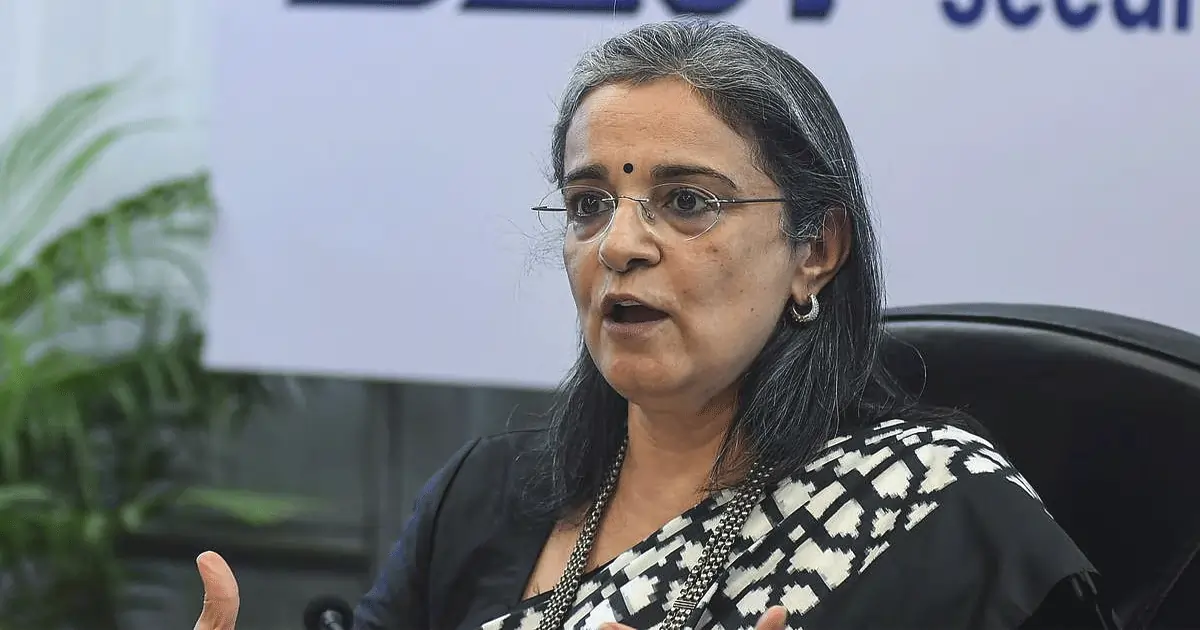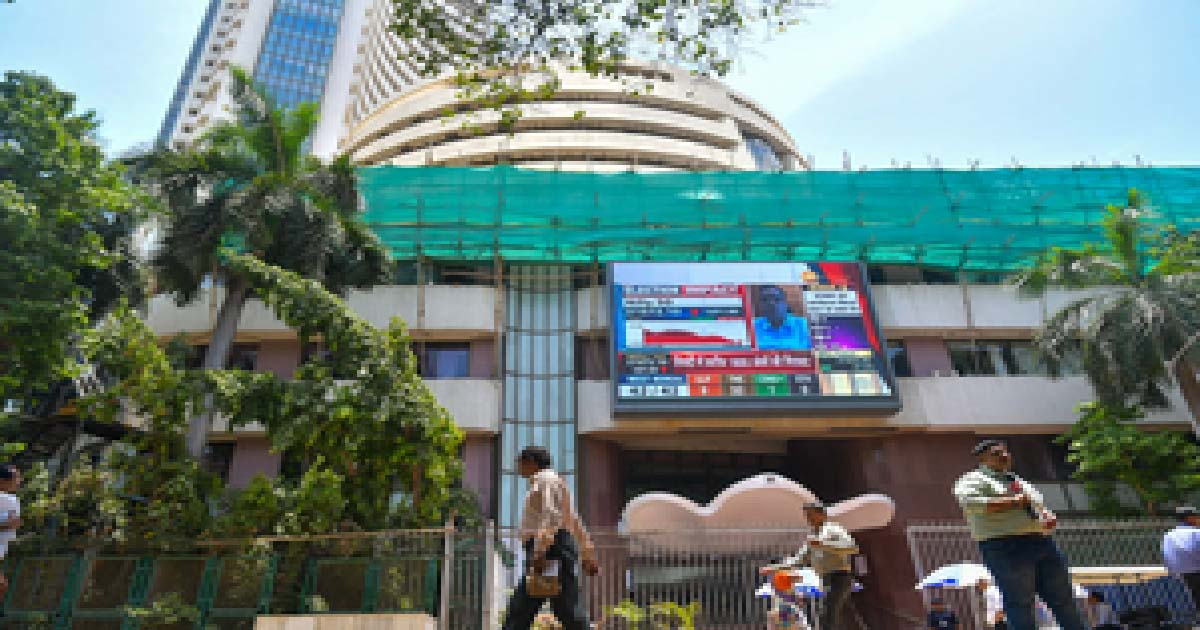Business
Bombay HC Stays FIR Order Against Ex-SEBI Chief Madhabi Puri Buch & 5 Others In 1994 Stock Market Fraud Case

Mumbai: In a major relief to the former SEBI chairperson and five others, the Bombay High Court on Tuesday stayed the special court’s order directing the registration of an FIR against them in connection with an alleged stock market fraud and regulatory violations dating back to 1994.
The court noted that the special judge had passed the order mechanically, without examining the details or attributing any specific role to the accused.
Observation Made By Justice Shivkumar Dige
“It appears that the learned judge (special ACB judge) has passed the order mechanically, without going into the details and without attributing any specific role to the applicants. Hence, the order is stayed till the next date,” Justice Shivkumar Dige ordered.
Bombay HC Stays The Order
The HC stayed the order while hearing petitions filed by Buch, three current whole-time SEBI directors — Ashwani Bhatia, Ananth Narayan G, and Kamlesh Chandra Varshney — and two BSE officials — Managing Director and Chief Executive Officer Ramamurthy, and its former chairman and public interest director, Pramod Agarwal.
On March 1, the special court had directed the Anti-Corruption Bureau to register an FIR against the six individuals.
They approached the HC on Monday, seeking to quash the special court’s order, contending that it was “unjust” and “harsh.” The officials argued that none of them held their current positions in 1994 and that the trial court ought to have recognized that “no vicarious liability can be fastened” on them.
Arguments Made By Solicitor General Of India
Solicitor General of India Tushar Mehta, appearing for the three whole-time SEBI directors, submitted that the complainant, Sapan Shrivastava, was a habitual litigant. He also pointed out that the high court had previously imposed a cost of Rs5 lakh on him for filing a frivolous petition.
Terming Shrivastava’s allegations vague, Mehta argued that no specific accusations had been leveled against the officials. He said the complainant sought a probe into an IPO from 1994, when the six officials were not holding any positions in SEBI or BSE.
“No averments, no explanations given — just a statement that SEBI has failed to discharge its duties. The complaint has been filed against officers who are in office now, for an alleged offense presumed to have taken place in 1994. How can they be held responsible?” Mehta questioned.
Arguments Made By Senior Advocate Amit Desai, Representing The Two BSE Officials
Senior advocate Amit Desai, representing the two BSE officials, said the complainant had made scandalous statements with serious ramifications for the economy, as vague allegations were being made against members of the principal capital market regulatory body.
Further, Desai argued that the special court judge had erred by not ensuring compliance with the Prevention of Corruption Act, which requires sanction for investigating public servants.
“Today’s economy largely survives on an inflow of funds. Taking this type of action (ordering the registration of an FIR) is an attack on the country’s economy. Such action against a market regulator — how frivolous can it get? Unfortunately, the judge did not realize the extent of the matter,” Desai submitted.
Moreover, Desai pointed out that the company in question had been delisted from the BSE in 2019, while the complaint was filed before the court in March 2024.
Senior advocate Sudeep Pasbola, appearing for Buch, also argued that action could not have been taken based on vague allegations made by the complainant.
The complainant, Shrivastava, sought time to file a reply to the petitions.
Justice Dige granted time for the reply and scheduled the matter for hearing after four weeks while staying the special court’s order.
Business
Nifty, Sensex rally for 2nd week over strong Q2 earnings, domestic inflows

Mumbai, Nov 29: The Indian equity benchmarks made marginal gains for the third consecutive week, supported by positive global cues, robust domestic inflows and strong Q2 earnings.
Benchmark indices Nifty and Sensex edged higher 0.34 and 0.52 per cent this week to close at 26,202 and 85,706, respectively.
Analysts said that global cues remained supportive, aided by softer US yields, renewed expectations of a Fed rate cut, and benign crude prices that helped temper inflation concerns.
Broader indices underperformed, with the Nifty Midcap100 and Smallcap100 ending the week down 0.11 per cent and 0.10 per cent respectively.
Gains during the week were led by pharma, PSU banks, media, and IT, while realty, consumer durables, and oil & gas lagged behind.
Indian equities navigated a highly eventful week characterised by alternating phases of volatility, resilience and profit booking, finally closing the week on a positive note.
Nifty reached an intra-day low of 25,842 before bouncing back and making a high of 26,310 on the last day of trading week.
Bharat K Gala, President, Technical Head, Ventura, said that key corrective zones traders should watch out for is the support zone at 25,851–25,566. A breach of this level can take the index to 25,337 and further to 25,107–24,780 zone.
Domestically, the stronger-than-expected Q2 GDP print, driven by resilient manufacturing, solid construction activity, and healthy private consumption, is set to support sentiment in the near term, market watchers said.
With robust GDP momentum and improving credit growth providing a solid backdrop for earnings acceleration in H2, the medium-term outlook remains positive, they added.
Investors look for cues next week from a critical lineup of macro data, including India and US PMI releases, US core PCE inflation and the RBI’s policy decision.
Business
India in talks with 50 nations on fair trade deals: Piyush Goyal

New Delhi, Nov 28: Commerce and Industry Minister Piyush Goyal said on Friday that India is currently engaged in discussions on fair and balanced trade deals with 14 countries or groups representing nearly 50 nations, including the United States, the European Union, GCC countries, New Zealand, Israel, Eurasia, Canada, South Africa and the Mercosur group.
Addressing the annual general meeting of the Federation of Indian Chambers of Commerce and Industry (FICCI) here, the minister underlined that balanced and equitable trade agreements have already been concluded with Australia, the UAE, Mauritius, the United Kingdom and the four-nation EFTA bloc.
Highlighting broader global developments, the minister said that recent geopolitical and economic challenges have underscored the need for trusted partners and resilient supply chains. He stated that India’s expanding network of free trade agreements (FTAs) and economic partnerships is aimed at building long-term cooperation anchored in fairness, transparency and mutual benefit.
Goyal said that the idea of self-reliance is central in India’s civilisational ethos, recalling references from the Bhagavad Gita and Mahatma Gandhi’s emphasis on Swadeshi. He said that self-reliance has historically guided India’s progress and continues to remain central to the country’s economic strategy. He added that this vision has been strengthened through the focus on Atmanirbhar Bharat under the leadership of Prime Minister Narendra Modi.
Referring to the recent EFTA agreement, the minister noted that the bloc has committed to invest $100 billion in India across innovation and precision manufacturing. He underscored India’s cost competitiveness in research and innovation, stating that high-quality innovation undertaken in India can be achieved at a fraction of the cost compared to Europe or the United States.
The Minister highlighted India’s strengths in innovation and technology, supported by a young demographic, increasing digital adoption and a growing talent pool. He said that India’s large number of STEM graduates and widespread internet access create strong potential in emerging areas such as applied artificial intelligence, automation, robotics and deep-tech innovation.
He noted that the recently announced $12 billion Research, Development and Innovation (RDI) fund, along with ongoing support to startups and deep-tech industries, will further accelerate India’s innovation ecosystem.
Goyal emphasised the importance of strengthening skilling to prepare India’s youth for future opportunities. He said that unlike many developed economies facing ageing populations, India’s youthful demographic is quick to adapt to emerging technologies and has already demonstrated high engagement with digital platforms. He added that this readiness positions India to play a major role in the global technology landscape.
The minister outlined India’s strengths through the ‘PESTLE’ framework, noting that Prime Minister Modi has consistently advanced the vision of self-reliance across sectors. He said that politically, a stable and predictable government committed to “Minimum Government, Maximum Governance” has enhanced investor confidence. In the economic domain, initiatives such as the National Manufacturing Mission and the Rs 25,000 crore Export Promotion Mission are supporting India’s rise towards becoming the world’s third-largest economy.
On the social front, he highlighted that the four Labour Codes ensure better wages and protections, while the Antyodaya approach has supported the fulfilment of basic needs.
In the technology sector, Goyal pointed to initiatives aimed at reducing external dependence, including the Semiconductor Mission (Rs 76,000 crore) and the Rs 7,000 crore programme for permanent magnet production, which strengthen domestic manufacturing and supply chain security. In the legal domain, he referred to ongoing reforms, including progress toward Jan Vishwas 3.0, designed to enhance ease of doing business.
He further noted that the ‘Atomic Energy Bill 2025’ marks a historic shift by opening up the nuclear sector to strengthen energy sovereignty.
The Minister urged FICCI to adopt a mission-driven approach to promoting innovation, deepening research and development, strengthening industry-academia linkages and supporting India’s journey towards becoming a developed nation by 2047.
Business
India projected to log 7 pc GDP growth in 2025: Report

New Delhi, Nov 28: Ahead of India’s Q2 GDP numbers on Friday, Moody’s Ratings said that the country is projected to clock 7 per cent GDP growth in 2025 and 6.4 per cent in 2026 due to domestic growth and economic resilience amid global disruptions.
The country will lead growth among emerging markets and in the Asia Pacific (APAC) region, said the global rating agency. “India will lead growth among emerging markets and across the region, with GDP growing 7 per cent in 2025 and 6.4 per cent in 2026,” according to a note by Moody’s Ratings.
The average GDP growth in APAC is projected to remain steady at 3.4 per cent in 2026, compared to expected growth of 3.6 per cent in 2025.
According to the rating agency, emerging markets will drive GDP growth in the region, with average growth of 5.6 per cent.
In September, Moody’s Ratings affirmed India’s long-term local and foreign-currency issuer ratings and the local-currency senior unsecured rating at Baa3. The global ratings agency has also maintained its outlook for India as stable.
“The rating affirmation and stable outlook reflect our view that India’s prevailing credit strengths, including its large, fast-growing economy, sound external position and stable domestic financing base for ongoing fiscal deficits, will be sustained,” Moody’s said in its note.
The rating agency has said that the US’ imposition of high tariffs on India will have limited negative effects on India’s economic growth in the near term. “However, it may constrain potential growth over the medium to long term by hindering India’s ambitions to develop a higher value-added export manufacturing sector,” said the rating agency.
India’s credit strength is balanced by long-standing weaknesses on the fiscal side which will remain. Strong GDP growth and gradual fiscal consolidation will lead to an only very gradual decline in the government’s high debt burden, and will not be sufficient to materially improve weak debt affordability, especially as recent fiscal measures to reinforce private consumption erode the government’s revenue base, according to the note.
-

 Crime3 years ago
Crime3 years agoClass 10 student jumps to death in Jaipur
-

 Maharashtra1 year ago
Maharashtra1 year agoMumbai Local Train Update: Central Railway’s New Timetable Comes Into Effect; Check Full List Of Revised Timings & Stations
-

 Maharashtra1 year ago
Maharashtra1 year agoMumbai To Go Toll-Free Tonight! Maharashtra Govt Announces Complete Toll Waiver For Light Motor Vehicles At All 5 Entry Points Of City
-

 Maharashtra1 year ago
Maharashtra1 year agoFalse photo of Imtiaz Jaleel’s rally, exposing the fooling conspiracy
-

 National News1 year ago
National News1 year agoMinistry of Railways rolls out Special Drive 4.0 with focus on digitisation, cleanliness, inclusiveness and grievance redressal
-

 Maharashtra1 year ago
Maharashtra1 year agoMaharashtra Elections 2024: Mumbai Metro & BEST Services Extended Till Midnight On Voting Day
-

 National News1 year ago
National News1 year agoJ&K: 4 Jawans Killed, 28 Injured After Bus Carrying BSF Personnel For Poll Duty Falls Into Gorge In Budgam; Terrifying Visuals Surface
-

 Crime1 year ago
Crime1 year agoBaba Siddique Murder: Mumbai Police Unable To Get Lawrence Bishnoi Custody Due To Home Ministry Order, Says Report












